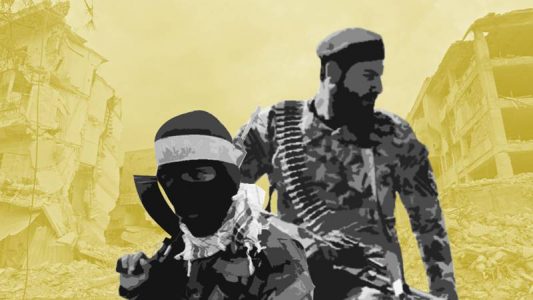
Despite the Islamic State defeat Pakistani men are still fighting in Syria
Pakistani men are still actively participating in the Syrian conflict even though two years have passed since their main motivation has ended with the loss of the Islamic State’s territory in Syria and Iraq.
This information has come from one of two men who were recently arrested by counter-terrorism law enforcers in a raid in Karachi. CTD officials discovered that one of them, identified as Kamran Haider Zaidi, was a member of Liwa Zainebiyoun.
The Liwa Zainebiyoun (People of Zainab Brigade) is a pro-Iran group made up of Pakistani fighters. It was formed to protect the shrine of Sayyidah Zainab (May Allah be pleased with her) in Syria from ISIS in what is believed to be 2014 or 2015.
An official said that Kamran Haider is believed to be a recruiter for Liwa Zainebiyoun and had been to Syria to fight ISIS. The suspect told investigators that around 250 Pakistani fighters were still active in Syria. The official requested anonymity because of the sensitivity of the matter.
Kamran Haider told investigators that the Pakistani men are taken to Tehran and from there they depart for Syria in special planes.
“There are four or five wanted Pakistani men hiding in Iran and they use their local network to recruit Shia men,” the official said. The recruiters tell young men that it is their religious obligation to protect the holy shrines. “And to support their claim, they tell them about religious decrees issued by the Iranian clerics.”
According to Phillip Smyth, a Soref fellow at the Washington Institute for Near East Policy, around 800 to 2,500 fighters are estimated to be in the group and were recruited by Iran’s Islamic Revolutionary Guard Corps to fight.
The deaths of at least 18 Liwa Zainebiyoun fighters in Syria’s Idlib province during attacks by Turkish forces in the last week of February suggest that Pakistanis were not taken to Syria to fight only ISIS. “That presupposes that their main goal for creation was to fight ISIS,” said Smyth, who is an expert on Iranian proxy groups. “It was not.”
The Pakistani fighters are fighting a variety of factions, “Turkish proxies, Syrian rebel groups, Sunni jihadists, and Harakat Ahrar al-Sham al-Islamiyyah,” he added. “They fight alongside and support Assad and pro-Assad forces.”
Other experts say that Iran’s proxy groups such as Liwa Zainebiyoun operate in line with Iran’s regional strategic objectives. “While ISIS has been defeated, Iran’s proxy groups are still functional in Syria and other countries,” said Hasan Abdullah, a Turkey-based Pakistani journalist.
Syria’s Idlib is the last known stronghold of anti-Bashar al-Assad rebels. The fighting in Idlib escalated in recent weeks when Turkey sent troops to stop advances of the Syrian president’s forces.
Abdullah said that Turkish officials haven’t publicly commented on the role of Pakistani fighters in Syria. “When it comes to Pakistan, Turkish officials are usually very careful to guard what they call a special relationship,” he explained. “I have asked several people in the government if President Erdogan raised this matter with Prime Minister Imran Khan. They said Ankara does not see Pakistani fighters in Syria fighting against Turkish interests as a state-driven or state-encouraged policy.”
He said, however, that Turkish officials would like Pakistan to prevent the movement of militants to Syria.
Pakistani and international media have been reporting for the past several years that Iran is recruiting Pakistani men to fight in the Middle East. The clerics do not publicly admit this. They do, however, tell stories of Pakistani men fighting in Syria in private religious gatherings.
At one majlis, Allama Sadiq Raza Taqvi, a leader of the Majlis Wahdat-e-Muslimeen, told people that a Pakistani man, who was injured while protecting the shrine of Zainab, was paid a “visit” by Bibi Zehra (May Allah be pleased with her) in his last days. The sermon was delivered somewhere in Karachi on February 23, according to a video uploaded onto YouTube.
Allama Taqvi has denied making these remarks when he was contacted and said that the video must be an old one. The cleric was actually talking about Sajjad Ali, a man who was injured in Syria two years ago. His funeral was held in an Imambargah in Karachi’s Pehlwan Goth on February 15.
A young man, who attended Ali’s funeral, confirmed that he fought in Syria and returned to Karachi after being injured. He also requested anonymity.
He claimed that hundreds of young men from Parachinar, a city in Khyber Pakhtunkhwa’s Kurram district, Balochistan and Karachi had gone to Syria in the past several years. He explained that a student organization played a key role in the recruitment of young men.
“Recruiting young men is not an uphill task,” he said. “Most of the Shia families in Pakistan lost several members in sectarian attacks and for them it is a chance to avenge their murders.” Their families are financially supported by the recruiters, he added.
Source: Samaa TV





